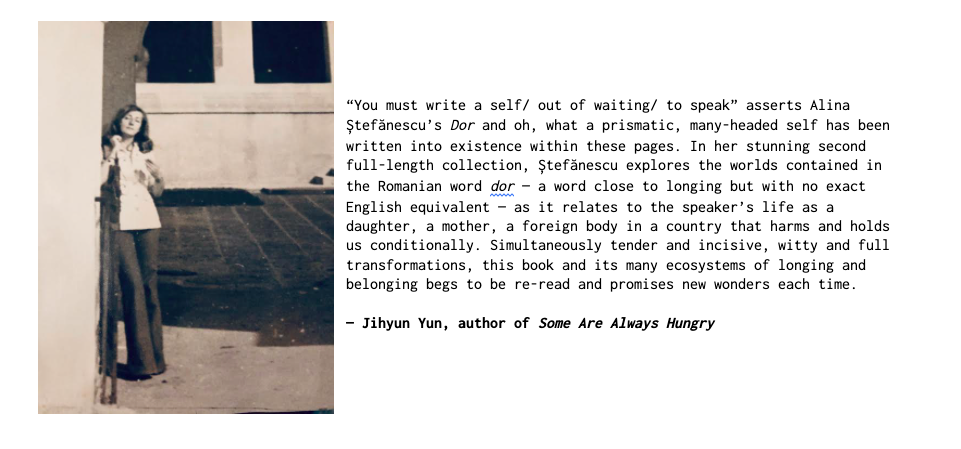Dor by Alina Stefanescu
with illustrations and cover design by Ioana Hobai
Wandering Aengus Press
Sept. 22, 2021
ISBN 0578915782
112 pp.
$20.00 USD
Listed on Bookscrolling’s Best Poetry Books for 2021
Listed on ENTROPY Best of 2020-2021 Poetry Books
Like my mother, I planted
a Romanian plum sapling
in the northeast corner of the yard
to keep evil away. Like my father,
I take three thimbles of tuica
before dinner to prepare the throat
for what the mouth may say.
from “Pickled Plums” in Pocket Samovar
Support your local indie bookstore by orderig a copy from BOOKSHOP.ORG.
Winner of the 2021 Wandering Aengus Press Book Award
“Review of Dor”
by Carmen Bugan
(Harvard Review Online, April 2022)
“Review of Dor by Alina Stefanescu”
by Daniel A. Rabuzzi
(The Los Angeles Review, Feb. 2022)
“I Am Going Holy or Bust: A Review of Alina Stefanescu’s Dor”
by Nicole Yurcaba
(Tupelo Quarterly, February 2022)
Featured on “The Poet’s Nightstand with A.E. Stallings”
(Poetry Society of America, 2022)
“Magic City Poet Wows Again With DOR: Alina Stefanescu blends her Romanian and Alabamian
upbringings to create a beautiful new perspective”
by Tim Majors
(About Town, Sept. 30, 2021)
“Two new poetry books by Birmingham writers”
by C. T. Salazar
(Mississippi Clarion-Ledger, Nov. 2021)
My relationship to Romanian history is more tangled, since my relatives and family were directly implicated in the crimes of the last century, whether by witness, silence, patriotism, or lack of dissent. The only stories I can tell about this place called the South are the ones written from the margins, from those foreign bodies trying to get in, fit in, be accepted, be safe. Having studied the cost of entry into the stadium, it is difficult for me to pay it. With Romania, on the other hand, I don't have a choice; I am my parents' daughter, the child of defectors, the reckless blood of running away.
- In conversation with Tom Simpson
But the world did not end
when I studied your thighs like scripture.
The sun failed to fall as we slept
on a broken sailboat in Cap D'Antibes,
when we made pillows from dirty shirts,
made love from couscous and pigeons.
The ground stayed firm
when I shaved my legs in the public fountain,
and this flesh, this flesh
so easy then, to rinse.
- from “Proper Fugue” in River Heron Review
Dor-Adjacent Interviews, Conversations, and Annotations
Father Constantine returns
from Mount Athos with ashes.
They are magic, he says, it’s a mystery.
I am thirteen, ready to marry, pledge
my dreams to a monk or nothing.
I want a spouse who can never
appreciate the world in me.
I want a simple man who will leave
his girl for incense, or vespers.
- from “First Crush” published in The Maine Review
She will finish a poetry collection titled Dor, a word for longing which many Romanians find untranslatable. In this book, she will not attempt to translate dor so much as paint it, layering it over photos, memories, exiles. The poems will include several fugues inspired by Ioan Petru Culianu’s short stories and prose pieces, gathered in Arta fugii (Borbely 2013), which has a double significance in Romanian, where fugue indicates both a musical form that relies on repetitive counterpoint as well as the act of running, or fuga, motion undergirded by a wish to escape or flee. The poems will exploit this double-meaning in the context of her parents’ defection and the musical form itself.
(In conversation with Paul Celan, Mihai Sebastian, Rosmarie Waldrop, Jean Daive, and others)
There’s an intersection between fascination and transgression that feels very Judeo-Christian somehow, but it’s also what drives me, or what I want to contest. Constantly this line between the sacred and the profane, or how it shapes us. Jean Bourdeillette said: “Every chalice is a dwelling-place.” Every hallowed object is space which beckons one to write the poem inside it. It never comes fully-formed…always as a series of fascinations and edges.
(In conversation with Lucy Writers Reloaded)
In American, my primary, everyday language, something stays missing — there is a perpetual desperation to be placed, whereas, speaking Romanian, hearing Romanian (my first language, or the language that birthed and raised me) feels complete. It’s mysteries and worries are mine, or they resonate without annotation. So Romanian is a context, while American is constantly seeking its context, or creating it, tying little boot-straps to language, inventing families and community from corporate discourse, trying to make itself complete.
Only in the U.S. are emigres allowed to invent a nation-state of of innocence or normative goodness. Maybe the American dream also includes the idealization of the lands left behind. .. the myth of the magical homeland where locals only hurt each other due to colonization by Soviet or Ottoman empires gets fueled by emigre communities, including my own.
- In conversation with Nazli Karabiyikoglu







